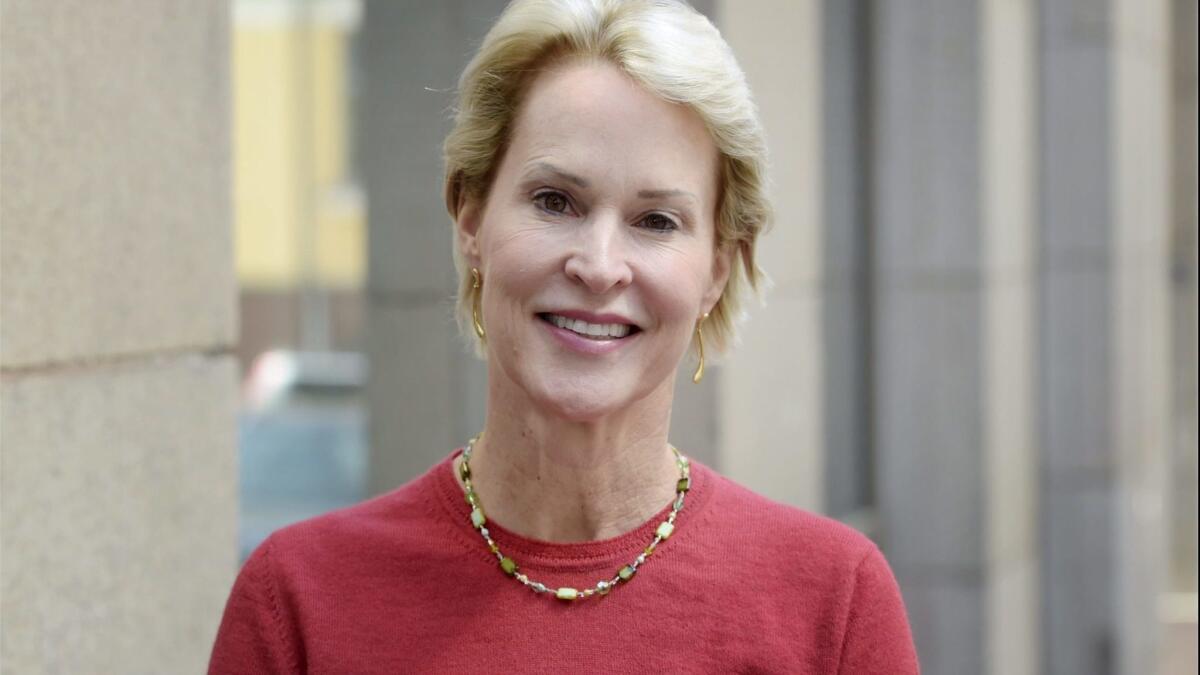Three scientists, one of them from La Cañada, have won the Nobel Prize in chemistry

- Share via
Since the dawn of life on our planet, 3.7 billion years ago, nature has used the power of evolution to create a vast diversity of molecules with an ever-increasing array of chemical capabilities.
The Royal Swedish Academy of Science awarded the 2018 Nobel Prize in chemistry Wednesday to three scientists who have harnessed that power and sped it up, allowing them to create never-before-seen chemical reactions in a process called directed evolution.
Claes Gustafsson, chairman of the 2018 Nobel Committee for Chemistry, called their work “a revolution in evolution.”
“Our laureates have applied the principles of Darwin in the test tube and used this approach to develop new types of chemicals for the great benefit of humankind,” he said.
Frances Arnold, a La Cañada Flintridge resident of 17 years and biochemical engineer at Caltech, was awarded one half of the $1.01-million prize for conducting the first directed evolution experiments in 1993. Her work has led to the creation of more environmentally friendly ways of making drugs, agricultural chemicals and fuels, among other products.
The other half was split between George P. Smith of the University of Missouri in Columbia and Gregory P. Winter of the MRC Laboratory of Molecular Biology in Cambridge, England. Smith came up with a new way to evolve proteins using viruses that infect bacteria, and Winter used it to create antibodies with the goal of producing new medicines.
Without this method, known as phage display, people with rheumatoid arthritis would not have the drug Humira, and patients with systemic lupus would not be able to take Benlysta, to name a few examples.
Arnold, 62, said the phone call from Stockholm had her “bouncing off the walls.” But it came with a measure of annoyance because she was traveling in Texas and couldn’t rouse her family in California to share the news.
“They never answer the phone when Mom calls,” she said. “I can’t wait to get home and tell my sons.”
In the ’80s, after President Ronald Reagan was elected and federal research funding priorities changed, Arnold became interested in biofuels research and received a doctorate in chemical engineering at UC Berkeley, where she was exposed to emerging breakthroughs in DNA research.
Arnold said her training in mechanical engineering was an advantage when she began tinkering with proteins.
“I was able to look at the problem with a totally fresh set of eyes,” she said. “I realized that the way most people were going about protein engineering was doomed to failure.”
Arnold said her work on directed evolution began, in part, in a fit of desperation.
“I was an assistant professor at Caltech, which has lofty aspirations for doing really important work, and I was pretty clueless,” she told the L.A. Times two years ago, 30 years after she arrived at the university. “I didn’t know how to make proteins. So I started doing lots of experiments simultaneously, and I realized that’s exactly what nature does.”
Harvey Blanch, a professor of biochemical engineering at UC Berkeley who was Arnold’s thesis advisor there, said her experiments have fundamentally changed the way scientists think about working with enzymes.
“Prior to Frances’ work, the idea of how to make an enzyme better was based on the concept that you have to really understand the details of what the enzyme is doing, and know everything about its structure,” he said Wednesday.
What Arnold did was mix in the element of randomness that is the cornerstone of natural evolution.
“It was an important conceptual approach,” he said. “By doing what nature does, you can get the job done much more quickly.”
In 2011, in recognition of her pioneering work in directed evolution, Arnold was awarded the Draper Prize, established by the National Academy of Engineering. Arnold shared that award — and split its $500,000 in prize money — with Willem Stemmer, who has used directed evolution to develop advanced biopharmaceuticals.
In 2016 Arnold traveled to Helsinki to accept the Millennium Technology Prize awarded every two years by the Technology Academy of Finland. She was the first woman to be recognized with the honor, which came with $1.1 million.
Wednesday morning, Arnold, the mother of three, sent out a tweet expressing her appreciation for the outpouring of congratulations she’d received: “Thank you everyone! I love this supportive community. I’m stunned, and now I just have to get home from Dallas...”
Deborah Netburn and Karen Kaplan are Los Angeles Times writers. La Cañada Valley Sun staff contributed to this report.

